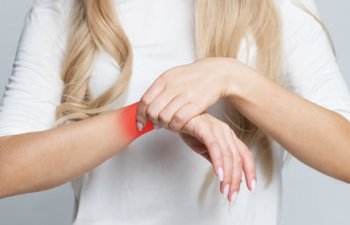
If you have experienced the tell-tale signs of Carpal Tunnel Syndrome, you know the pain that can be involved. This syndrome can happen because of repetitive injuries and strains caused by typing, twisting or grasping. Unfortunately, the pain doesn’t let off in the night hours. This intense gripping pain sensation can wake you and keep you up at night.
Numbness, tingling or weakness in your hand is a symptom of carpal tunnel syndrome, also called median nerve compression. This occurs when your median nerve is pressed. Your median nerve runs the length of your arm, passes through your wrist through your carpal tunnel to end in your hand. The median nerve is responsible for controlling the movement and sensation of your thumb, as well as the movement of all of your fingers except for your pinky.
Median nerve damage or pressure may occur as a result of workplace factors. Carpal Tunnel Syndrome is not isolated to one industry or job, but may be more prevalent in those performing assembly line work like manufacturing, sewing, finishing or cleaning. The unique anatomy of your wrist, health issues and repetitive hand movements contribute to this syndrome.
Symptoms of Carpal Tunnel Syndrome
In the event of carpal tunnel, you may notice numbness, burning or tingling in the fingers, particularly the thumb, index and middle fingers. You might also feel weakness when gripping objects with one or both hands. Pain or numbness may also be worse at night, interrupting your sleep.
Three times as many women suffer from this ailment than men. The risk of compression is also greater among those with diabetes or other metabolic diseases that affect the body’s nerves. Adults are more likely to suffer from carpal tunnel syndrome.
Treatment Modalities
By splinting your hand, you prevent your wrist from moving. Additionally, it eases nerve compression inside the tunnel. If your carpal tunnel pain persists, you can use anti-inflammatory drugs, either oral or injected. As a result, nerve compression inflammation is relieved. Worksite changes can ease symptoms by moving your computer keyboard or making other ergonomic adjustments.
You don’t have to suffer from this condition. Contact the experts at Hanowell Spine Clinic for trusted treatment options.
Posted on behalf of
4142 Mill St. NE
Covington, GA 30014
Phone: (770) 787- 3550
FAX: (770) 787- 2304
Email: info@hanowellspineclinic.com
Mon-Fri: 8:30 AM - 5:00 PM
